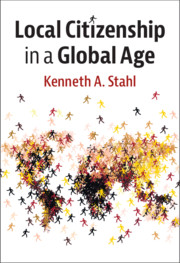Book contents
- Local Citizenship in a Global Age
- Local Citizenship in a Global Age
- Copyright page
- Dedication
- Contents
- Figures and Tables
- Acknowledgments
- Introduction
- Part I Citizenship Federalism
- Part II “Noncitizen Citizens”
- Part III Race, Space, Place, and Urban Citizenship
- 8 A Return to Urban Citizenship?
- 9 Republican Citizenship
- 10 Postmodern Citizenship
- 11 Differentiated Citizenship
- Conclusion
- Bibliography
- Index
11 - Differentiated Citizenship
from Part III - Race, Space, Place, and Urban Citizenship
Published online by Cambridge University Press: 08 June 2020
- Local Citizenship in a Global Age
- Local Citizenship in a Global Age
- Copyright page
- Dedication
- Contents
- Figures and Tables
- Acknowledgments
- Introduction
- Part I Citizenship Federalism
- Part II “Noncitizen Citizens”
- Part III Race, Space, Place, and Urban Citizenship
- 8 A Return to Urban Citizenship?
- 9 Republican Citizenship
- 10 Postmodern Citizenship
- 11 Differentiated Citizenship
- Conclusion
- Bibliography
- Index
Summary
Finally, chapter 11 considers “differentiated” citizenship. This model would incorporate people into the political life of the city as members of their cultural subgroups rather than as individuals. Differentiated citizenship thus enables historically marginalized groups to assert collective rights that have often been denied them under the individualistic liberal model. These groups would have the ability to exercise control over places with which they share deep cultural, economic and political ties. Differentiated citizenship thus attempts to steer between republican and postmodern citizenship. It calls for recognition of normative subgroups in society, but in a manner that will incorporate those subgroups into political life, rather than enabling them to withdraw from political life. Differentiated citizenship rejects both the republican insistence upon a homogenous political community that rigidly polices its borders as well as the postmodern refusal to draw boundary lines at all. Ultimately, differentiated citizenship is problematic because it reinforces the marginalization of the groups it wishes to empower by legitimizing the status quo of racially identified places.
Keywords
- Type
- Chapter
- Information
- Local Citizenship in a Global Age , pp. 208 - 224Publisher: Cambridge University PressPrint publication year: 2020



